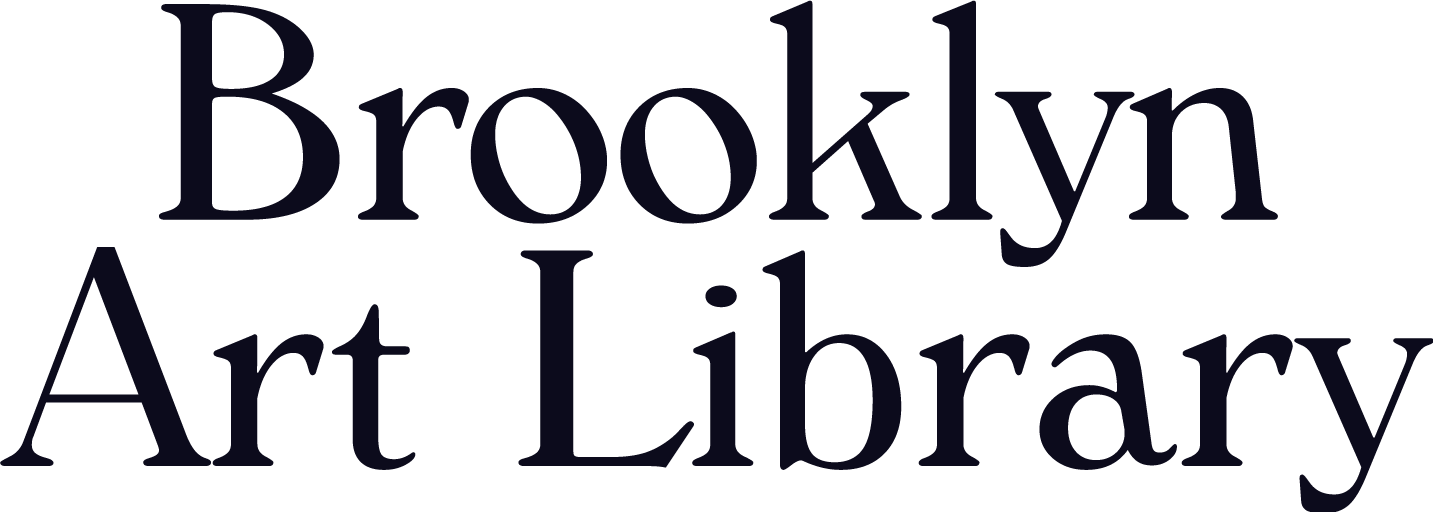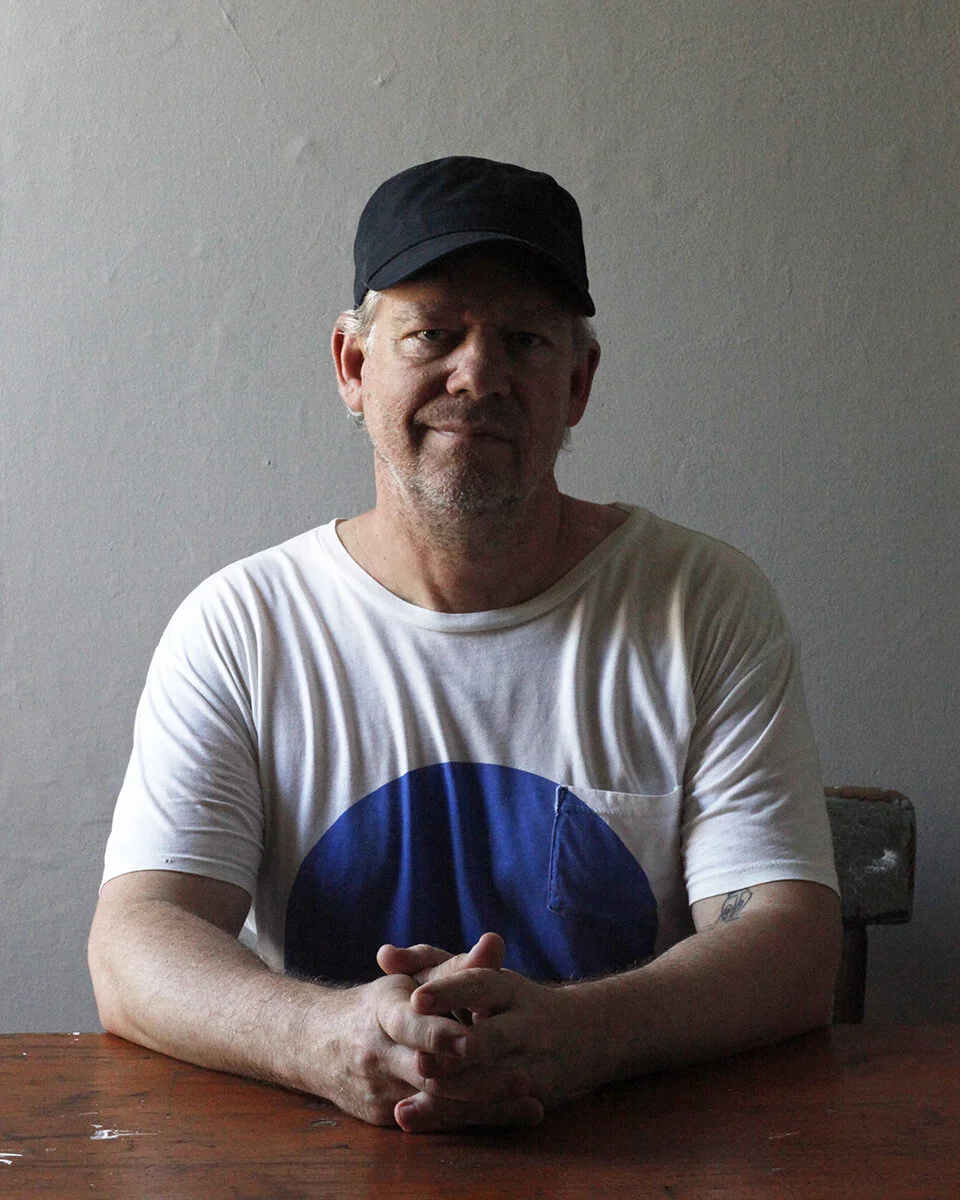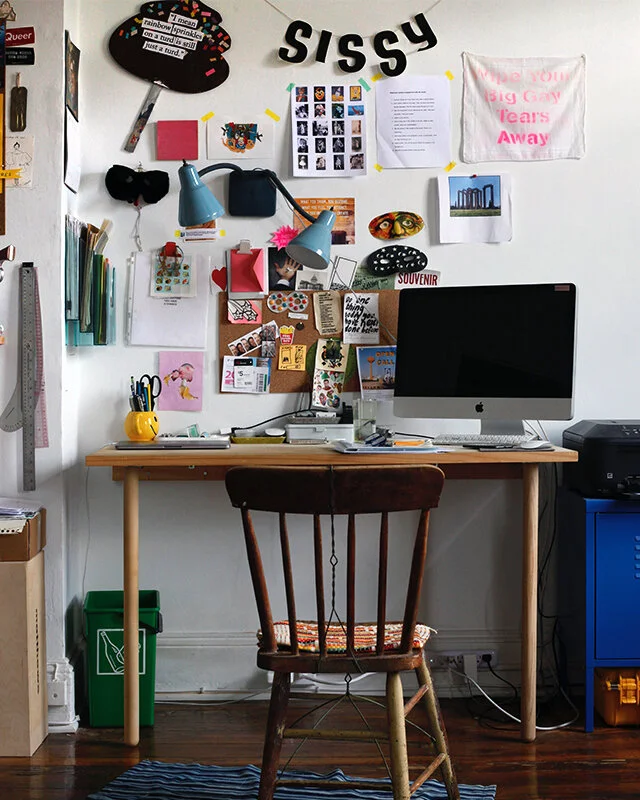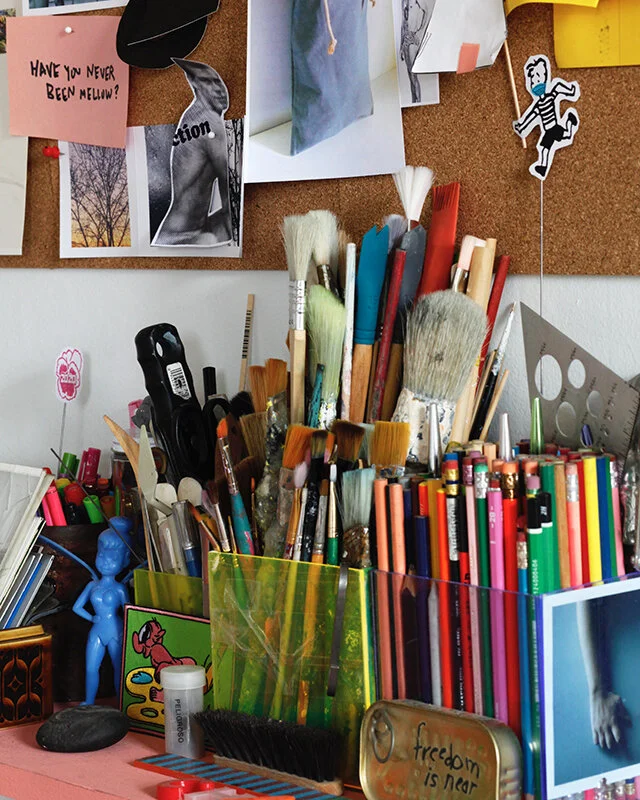SBP x Pride: Charlie Welch
Charlie Welch has made a name for himself not only through his photography and set design, but for his work on zines and other multimedia projects through Sissy Boy. Welch’s bold style merges sculptural forms and with the alchemical power of collage, creating gorgeous images and installations for both his fine art and commercial portfolio. As a photographer and prop stylist, Charlie has worked on projects for Coachella, BHLDN, Tiffany & Co., Becoming Iceland, Warby Parker, and more. In response to quarantine, he helped organize the live-streamed Stay the F*ck At Home Film Festival. He has exhibited his work at the NY Queer Zine Fair (of which he was a co-founder), both the New York and Los Angeles Art Book Fair, Schoolhouse Gallery, and he has participated in Visual AIDS’s annual benefit exhibition, Postcards From The Edge, since 2014. You can see more of his artwork on his website and keep up with his latest endeavors on Instagram.
Your sketchbook “Hey Sailor!” taps into this rich queer history of maritime life through collage and archival photographs. What inspired you to make this book and can you speak about your process in crafting the spreads on these pages?
Sailors have always been eroticized/fetishized and for me it has a lot to do with the (perceived) intimacy between them. I think I was really drawn to this theme when I first saw a World War II photo of a sailor giving another a tattoo—the tenderness and attention between the two was so sexy. After that, I started building an image library of sailors and eventually I started finding so many photos of sailors who seemed to be lovers or at least in situations where I could create that fantasy.
My process of making “Hey Sailor!” was pretty random—I gathered various photos and old clip art and text and started assembling everything together with no specific sight in mind but what felt right and what made sense. That’s how I approach a lot of my projects and sometimes they end up very different from what I started out to make.
Your creative practice consists primarily of photography, but you also worked as a set designer and prop stylist. Can you speak about how object-based, spatial design has influenced how you see the world through your camera lens?
Whenever I make photos I often approach it like a still life or an installation, whether it’s a person or object. I try to plan out what I want to do and make notes and sketches, but again that often transforms into something vastly different than planned.
Also, a lot of my photographs are recordings of sculptural pieces that I make. I don’t really separate the two. A few years back I created a project called, You Can’t Go Home Again, and I spent a lot of time making replicas from memory of houses I grew up in and then photographed them and, though the construction, took so much longer I saw the prints as the final solution.
You’ve participated in book fairs like the Paris Ass Book Fair through Sissy Boy, and you were a co-organizer of the NY Queer Zine Fair until 2018. How does zine-making fit into your broader creative practice? Do you approach making these publications as you would a sketchbook or as standalone art objects?
I definitely look at them as standalone objects. I’m always interested in storytelling and zines are an easy method of creating stories. With my zines, I will have a ridiculous idea and it starts from there. Then I start researching and collecting images and then again randomly start to assemble. I try to stay as open when I make them and let the process be fluid and changing. I guess that’s a constant process in everything that I do.
When did you first begin making art?
I’ve been making things for as long as I can remember. It began with making my own toys and games out of discarded boxes, trash, etc., and I still often recycle and use similar items for projects.
Who are some of your queer creative heroes?
Most of my queer creative heroes are my friends. I’m very fortunate to know so many amazing and inspiring artists, writers, dancers, performers and musicians who are passionate and compassionate and really push creative boundaries.
If I had to pick some “famous” artists, I would say Arthur Tress, Leigh Bowery, and Pedro Almodóvar would be at the top of my list.
What does Pride mean to you?
This is something I’ve been thinking about a lot, especially with everything that is happening right now—dealing with COVID-19 and how we are treating each other, the murders of trans people, police brutality against black and brown communities—it’s forcing us all to really think about how we are navigating our space and what we can do as individuals to make for a better world.
Personally, a feeling of self-respect and fighting to be free and treated equally, but then taking that and applying it to a bigger picture. In turn, it’s about showing respect and fighting for everyone and especially for other communities who are being discriminated against and held back in society. We all need to stand together, queer or not, and build coalitions and build stronger communities to support and hold each other up.
What are some important issues you think we should be aware of in the global LGBTQ+ community?
I’ve always felt that as long as there is someone who is being discriminated against, then we haven’t achieved equality. There are still places in this world where queers can be sentenced to death and we need to fight for and support all people. I think some have difficulty doing that if they don’t see how it doesn’t directly affect their life. We need to realize that we all are connected and share in this world and need to protect and take care of each other.
I also feel there is so much discrimination within the LGBTQ+ communities that we need to tackle. Racism, transphobia, classism, slut-shaming, discrimination against boys who are too femme and girls who are too butch, etc. One of the greatest parts of being queer, and being human, is how different we all are and celebrating and learning and growing from that.
Do you have any advice for anyone struggling with coming out or with their identity?
As far as coming out, do it when you're ready. Fortunately, today there are so many resources for queers, young and old, to find support and communities to help with the challenges of coming out. Identity can be more complicated as it can change but I would say to always find ways to challenge yourself and how you want to participate and be seen in this world.
We’re in a very difficult moment now, politically, health-wise. Can you speak about how you have used art to cope with tough times? Do you have any advice for those struggling to stay creative right now?
In some ways the lockdown has been good for me as I’ve been able to find the time and energy to pursue some projects that I’ve wanted to get started. I’m also very comfortable being with myself and focusing on a project for an extended amount of time. I do know some people who have felt creatively paralyzed during this time. My advice would be to really listen to yourself and your body and take care of yourself.
If you’re having struggles with your own creativity then try looking at others' work. Watch movies. Listen to music. Find new artists—there are so many great websites now that showcase a diversity of artists as well as right now there are many museums and institutions that have set up some incredible free online resources and viewings. Also I think it’s important to share artists that inspire you - by doing that you could help someone else open up and get inspired.
How can people support your work? Are there any organizations you would like others to support as well?
I think it’s incredibly important to support our local community organizations - change in this country will come from there and people will see more direct change rather than waiting for anything to happen on federal levels. I also think right now it’s important to put as much support as possible behind Black Lives Matter, local bail fund organizations, and local anti-racism groups.
Additionally, here are a few other organizations that I think are good to support: NYC Anti-Violence Project, LGBTQ Freedom Fund, Feeding America, Hetrick-Martin Institute, and ACLU.





